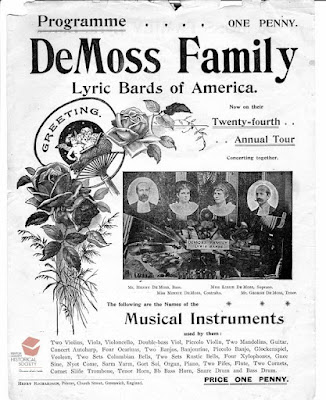For more than sixty years, The DeMoss Family Lyric Bards entertained people throughout the United States, Canada, and Europe with their musical talents.
The DeMoss family left North Powder and moved to Cove, Oregon, where he established a toll bridge across the Grande Ronde River. He also erected the first sawmill in the valley. James and Elizabeth began teaching music in the regions of Walla Walla, Umatilla, Cove, and the Grande Ronde.
By the 1870s, the couple had five children and all five of them were touted as musical prodigies. Henry, George, Minnie, Lizzie, and May helped build their parents reputation as exceptional performers.
In 1872, they headed back to Iowa, giving concerts along the way. It was reported that Elizabeth's singing was so favored, people often tossed money on the platform when she sang a solo.
The family spent the next ten years in the Midwest where the children were educated and they traveled around giving concerts.
Reportedly, the family played forty-one instruments in a variety of arrangements and wrote many of their own songs. Henry was able to play "Old Hundred" on the organ with one hand and "Yankee Doodle" with the other while singing "Home, Sweet Home." George was reported to hold the unique talent of playing two coronets at once: one a tenor and the other a soprano.
The family traveled by railroad, stage, and team bringing their entertainment to scattered settlements and cities from Mexico to the Northwest Territory.
In 1882, they were in San Francisco when Henry began to fiercely long for Oregon. Homesick, he composed the famous song, "Sweet Oregon" which was the state's unofficial song until 1927 when it formally adopted "Oregon, My Oregon." But at the close of each family show, they would perform "Sweet Oregon."
In 1883, the family staked a homestead in Sherman County and purchased 800 acres. (If you've read my Grass Valley stories, it is located in Sherman County.) The site became known as DeMoss Springs, a temperance town where no liquor was allowed. The town was never incorporated, but it did become a park that is known as DeMoss Springs today.
May died of malaria while in California in 1886, and Elizabeth passed away later that year.
In 1887, the family added "Lyric Bards" to their name due to their ability to compose both words and music. After their father remarried and focused more in missionary work, the four remaining siblings continued to perform together.
The family was commissioned by World's Fair organizers to write state songs for the World Columbian Exposition in 1893.
Minnie died quite suddenly in 1897, leaving a whole in the group that was hard to fill. Minnie had been a poet, composter, vocalist, and instrumentalist. The family eventually invited Aurelia Davis and her brother P. Waldo Davis to join them. That same year, the DeMoss Family Lyric Bards purchased the Hank Monk stage coach, known for transporting many dignitaries in its day. It was used for many years by them to travel to performances.
P. Waldo Davis married Lizzie. Their union produced Herschel, who performed on the stage and was affectionately known as "Director of the Band." George married Aurelia. Their son Elbert was also musically inclined and began performing at the age of two.
The last original member of the DeMoss Lyric Bards, Lizzie DeMoss Davis, died in 1941.
Hopeless romantic Shanna Hatfield received a rural
foundation on a farm her family wrested out of the Eastern Oregon desert, uprooting
sagebrush, rock, and the random juniper
tree. She spent her growing up years there, where her dad raised hay, wheat,
corn, and cattle. Her childhood brimmed with sunshine, hay fever, and an
ongoing supply of learning experiences. When she wasn’t running amok on the
farm, her parents did their best to give her a strong foundation in faith.
Today, Shanna draws on her rural
roots to create sweet and wholesome historical and contemporary romances filled
with hope, humor, quirky small-town characters, realistic heroes, and women of
strength.
When this award-winning author isn’t writing, testing out new recipes
(she loves to bake!), or crafting with her hot glue gun, Shanna hangs out at
home in the Pacific Northwest with her beloved husband, better known as Captain
Cavedweller.
Stay in touch with Shanna through her website at http://shannahatfield.com






No comments:
Post a Comment